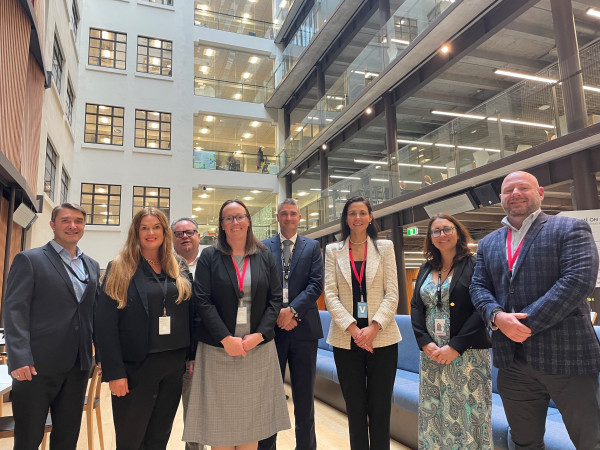Bilateral meeting with Standards Australia colleagues
We were pleased to host our partners from Standards Australia in February for a couple of days of bilateral meetings on the shared challenges, opportunities, priorities and initiatives behind joint Australia and New Zealand standards.

Left to right: Stanil Stanilov, Danielle Aberdeen, Chris Forsman, Karen Batt, Malcolm MacMillan, Kareen Riley-Takos, Clare Francis and Adam Stingemore.
The relationship has endured for over 41 years when the standards associations of Australia and New Zealand met in 1980 in Christchurch to increase trans-Tasman co-operation. Today the value of joint standards endures with them helping to bring consistency across the Tasman, open trade through shared specifications under a larger combined market and support interoperability for businesses’ products and services. That equates to thousands of standards used across multiple industries including within a number of regulatory systems in both Australia and New Zealand.
National Manager Malcolm MacMillan, with management team members Danielle Aberdeen (Manager Commercial and Sectors), Stanil Stanilov (Manager Standards Development) and Clare Francis (Principal Advisor) spent two busy days of meetings with Standards Australia’s Chief Development Officer Adam Stingemore, Chief Operating Officer Kareen Riley-Takos and Head of International Karen Batt.
Standards Australia and Standards New Zealand both operate in different environments and under different operating models, however differences aside there is much we have in common. This meeting gave us opportunity to discuss some of the international engagement projects where we need synergy, co-ordination and collaboration. Projects around supporting Pacific Island neighbours, including our involvement with the Pacific Islands Standards Committee. Understanding who is doing what helps us ensure we don’t double up or can learn from each other’s activities so there is efficiency. Both organisations have a wealth of expertise and knowledge we can share with our Pacific neighbours, some of whom are feeling the immediate impacts of climate change and requiring support to build resilience and economic development, in part through standardisation and conformance systems, quality infrastructure and capability.
Principal Project Manager Chris Forsman presented on some of our key projects including the work in hydrogen adoption where New Zealand is taking an active role and standards are being adopted support the necessary infrastructure and distribution networks. Here standards can support innovation by drawing on international expertise to provide real environmental and economical benefits.
Copyright was a point of discussion with conversations on how we go about protecting the integrity of content for trust and confidence by users. There was also an opportunity to meet members of our Standards Approval Board; Peter Gilbert and chair Victoria McLennan.
We also had some of the harder conversations around challenges associated with the sustainability of joint standards. With New Zealand’s much smaller population, smaller sectors and more limited industry players than Australia, seeking commissioning organisations to fund the upkeep and revision of standards is not without its challenges. As is finding subject matter expert committee representatives to play the fundamental role in helping to develop and revise content. With some industries there are challenges associated with ensuring balanced representation on development committees, so all voices are heard. We need sufficient technical expertise while also remaining committed to fair and proportionate contribution to joints development work. We welcome any organisation that uses joint standards to come forward for a discussion when new projects are being set up or revisions underway.
There is much that happens behind the scenes on joint standards that needed discussion - inter organisational communications, systematic reviews, committee member recruitment, consultation and decision-making processes, sales, copyright, licensing, royalties, products and services, technologies, business systems and approaches and international adoptions of ISO and IEC standards. All elements needed to support our globally connected economies and markets.
Joint standards represent what works well about standards and standardisation. People talking, sharing and developing solutions together for mutual benefit.
